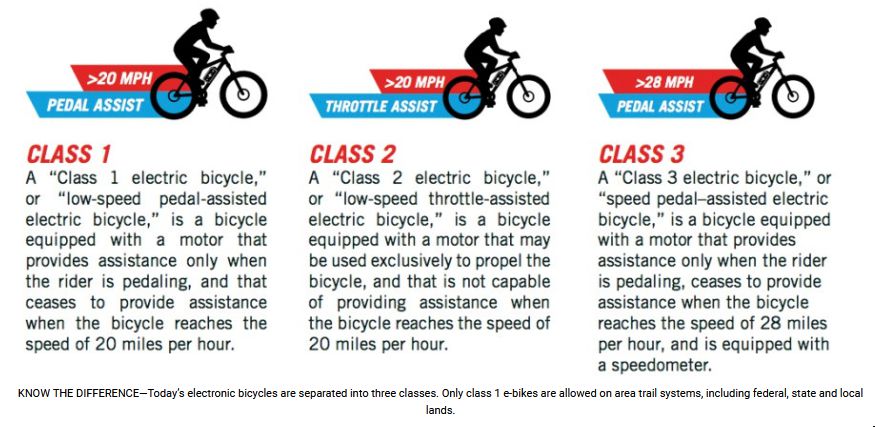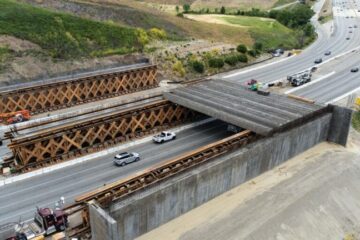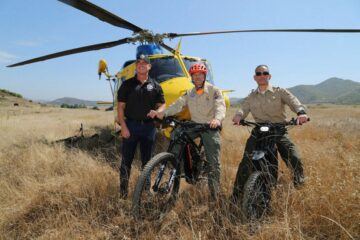COSCA chief charged up about proliferation of e-bikes in Conejo Open Space
Most e-bikes are not allowed in open space
Source of this article: The Thousand Oaks Acorn, February 24, 2023
Driven by concerns over the potential for injury and damage to trails, the Conejo Open Space Conservation Agency is trying to get the word out about which electric bikes are allowed on their property and which are not.
At the agency’s Feb. 8 meeting, administrator Brian Stark said park rangers and park users have reported increased sightings of illegal vehicles on lands owned by COSCA, a joint-powers authority consisting of the City of Thousand Oaks and the Conejo Rec and Park District.
“It’s clear to COSCA that some in our community need to become clearer on what vehicles are permitted on public multi-use trails . . . and how to treat natural areas respectfully, and how to ensure the safety of fellow outdoor visitors,” he said.
While there have been no reports of any serious injuries to date within the agency’s 15,000 acres, Stark said, the threat remains present when bikes capable of speeds of 25 mph or more share trails with walkers, joggers, cyclists, mountain bikers and equestrians.
“We’ve been experiencing a lot more calls,” he told the five-person board, explaining that there have been reports of conflicts when “a higher-speed vehicle and a hiker or a horse meet.”
These are potentially dangerous,” he said.
Some e-bikes look and feel like traditional bicycles, but they include an electric motor and battery for an extra boost.

Note: The top labels should say “<20 MPH” (LESS than 20 MPH) not “>20 MPH” (GREATER than…) for pedal assist.
As it stands today, the only e-bikes allowed on COSCA land are class 1, or pedal-assist bicycles. Class 1 e-bikes are also allowed by the National Park Service, California State Parks and the Mountains Conservation Recreation Authority. All other e-bikes—those that have some form of throttle—are banned, as are traditional dirt bikes, which have also been spotted on trails from time to time.
Beyond the danger of collision, there’s also the matter of environmental damage, Stark said.
Another challenge is the proliferation of illegal jump tracks, which the open space agency believes is tied, in part, to e-bikes.
A track discovered in December in Los Robles Open Space took over two days to take down plus repair and reseed the land.
“Building stunt tracks and illegal trails on protected open space starts as a misdemeanor offense, and civil penalties for the restoration costs can add up to thousands of dollars. In severe cases, penalties may be escalated,” Stark said.
Many offenders are teens, he said, and it is COSCA’s hope that by publicizing the problem, parents will understand that their children are breaking the rules and putting other trail users—and themselves—in jeopardy.
“There are currently no locations in the Conejo Valley where these electric motorcycles are permitted to ride legally,” he said. “We have no doubt these vehicles are fun. It’s not that we don’t recognize fun. We just think that they’re more appropriate for areas that are designated for them.”
COSCA hopes to educate the public so they know which bikes they can take on trails. To that end, the agency has reached out to several nationwide groups of cycling advocates, such as the International Mountain Biking Association, to put together an e-bike buyers’ guide.
Using social media and outreach on the websites and through schools, there will be a campaign to educate the public about permitted and unpermitted e-bikes.
Park board member Doug Nickles asked about recently enacted state legislation that encourage e-bikers to use the trails.
AB 1909, the so-called Omni- Bike Bill, opens most bikeways to e-bikes while still allowing communities to bar them from equestrian and hiking trails.
Stark said the law deals with state parks’ local open space.
Regarding enforcement, Stark said, the emphasis is on education, not writing tickets. Still, a violator could be subject to a citation for vehicular trespassing and a fine.
“For 45 years COSCA has depended on groups to ride and use the trails respectfully of each other, and it’s worked. We are seeing increased use of bicycles, and that’s great. We need to double down on community education,” he said.
At the end of the presentation, COSCA board member David Newman, an avid cyclist, wondered if classes were available to train e-bike users.
“E-bike riders have a lower skill level than motor bike riders, particularly because it’s perceived as a lower barrier of entry, whereas motor biking can be a lot of work,” Newman said.
While COSCA does not offer any classes, Stark said, that could be an option.
“A lot of people who are riding the e-mountain bikes are experienced mountain bike riders who have kind of aged-out. A lot of people we see on the streets are people who never thought to get a bike until they could get one that could help them out. We do have inexperienced cyclists in the community,” he said.





0 Comments